Ijraset Journal For Research in Applied Science and Engineering Technology
- Home / Ijraset
- On This Page
- Abstract
- Introduction
- Conclusion
- References
- Copyright
To Elevate the Preparation of Students for Placement by Developing a Website
Authors: Abhinav Kumar, Gaurav Kumar, Manibhushan Kumar
DOI Link: https://doi.org/10.22214/ijraset.2024.60948
Certificate: View Certificate
Abstract
Comprehensive platform designed to assist students and job seekers in achieving success in placement processes. Our website offers a diverse array of resources, tools, and guidance necessary to excel in various stages of placement, including aptitude tests, technical interviews, group discussions, and personal interviews. Users can access a wealth of study materials tailored to different industries and job roles, including aptitude test questions, programming exercises, case studies, and interview tips. Our extensive library of mock tests provides realistic simulations of placement exams, accompanied by detailed feedback and performance analysis to help users identify strengths and areas for improvement. Additionally, our expert-curated resources on interview preparation cover both technical and HR aspects, offering insight into commonly asked questions, sample answers, and strategies for handling challenging scenarios. The platform also features interactive learning modules and video tutorials on essential topics such as communication skills, problem-solving techniques, and career development strategies.
Introduction
I. INTRODUCTION
In today’s competitive job market, securing a placement or internship is a crucial milestone for students and graduates alike. The process of preparing for placements encompasses a wide array of skills, from aptitude testing to interview etiquette, and demands thorough preparation and strategic planning. Recognizing this need, online platforms dedicated to placement preparation have emerged as invaluable resources for candidates seeking to stand out in a crowded field of applicants. This essay delves into the landscape of placement preparation websites, exploring their significance, features, and impact on candidates' success. With a focus on providing comprehensive insights, this discussion will cover the evolution of placement preparation, the key features offered by these platforms, their benefits for users, and their role in shaping the future of recruitment processes. Evolution of Placement Preparation: The traditional approach to placement preparation often involved reliance on university resources, limited study materials, and sporadic guidance. However, with the advent of the internet and the increasing competitiveness of job markets, the landscape has evolved significantly. Placement preparation websites have emerged as dynamic platforms offering a wide range of resources and tools to aid candidates in their journey towards securing desirable placements. Initially, these platforms started as simple repositories of interview questions and tips. Over time, they have evolved into multifaceted ecosystems encompassing mock tests, interactive learning modules, community forums, and personalized guidance. This evolution reflects the changing needs of candidates and the growing complexity of recruitment processes. Key Features of Placement Preparation Websites: Modern placement preparation websites boast an array of features designed to address various aspects of the placement process comprehensively. These features include: Study Materials: Access to comprehensive study materials covering aptitude tests, technical interviews, case studies, and more, tailored to different industries and job roles. Mock Tests and Assessments: Simulated placement exams that provide candidates with realistic testing environments and detailed feedback to gauge their preparedness. Interview Preparation: Resources to help candidates prepare for technical and HR interviews, including sample questions, answers, and strategies for handling different interview scenarios. Resume and Portfolio Builders: Tools to create professional resumes and portfolios that highlight candidates’ skills, experiences, and achievements effectively. Interactive Learning Modules: Engaging modules and tutorials covering essential skills such as communication, problem-solving, and career development. Community Support: Vibrant forums where candidates can connect with peers, mentors, and industry professionals to share experiences, seek advice, and participate in discussions. Placement Updates: Regularly updated information on job openings, industry trends, and placement news to keep candidates informed and competitive. Benefits of Placement Preparation Websites: The benefits of utilizing placement preparation websites are manifold. These platforms provide candidates with: Convenience: Access to resources anytime, anywhere, allowing candidates to study at their own pace and convenience. Comprehensive Preparation: A wide range of materials covering all aspects of the placement process, ensuring candidates are well-prepared for every stage. Feedback and Improvement: Detailed feedback from mock tests and
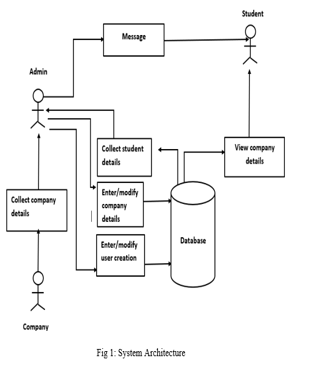
assessments helps candidates identify areas for improvement and track their progress over time. Networking Opportunities: Opportunities to connect with peers and professionals in their field, expanding their professional network and gaining valuable insights. Current Industry Insights: Access to the latest industry trends and job market updates, ensuring candidates are aware of relevant developments. Role in Shaping the Future of Recruitment: Placement preparation websites play a pivotal role in shaping the future of recruitment processes. By equipping candidates with the skills and resources needed to succeed, these platforms contribute to a more competitive and competent workforce. Moreover, they serve as a bridge between academia and industry, ensuring that graduates are well-prepared to meet the demands of the job market. As recruitment processes continue to evolve, driven by technological advancements and changing industry needs, placement preparation websites will remain essential tools for candidates seeking to navigate this dynamic landscape successfully. Conclusion: In conclusion, placement preparation websites have become indispensable resources for students and graduates embarking on their journey into the professional world. Offering a wide range of features and benefits, these platforms empower candidates to excel in the competitive placement process. As recruitment practices evolve, these websites will continue to play a vital role in shaping the future of talent acquisition and workforce development.
II. REVIEW OF LITERATURE
The landscape of placement preparation has witnessed significant evolution over the years, driven by changes in technology, education, and recruitment practices. This review examines the existing literature on placement preparation, focusing on key themes such as the importance of preparation, the role of technology, strategies for success, and the impact of placement preparation on candidates' outcomes. Importance of Preparation: Numerous studies emphasize the critical role of preparation in securing placements and internships. According to research by Brown and Hesketh (2004), candidates who engage in thorough preparation are more likely to perform well in interviews and assessments, leading to higher placement success rates. Similarly, Gupta and Bhatt (2019) highlight the correlation between preparation and confidence, suggesting that well-prepared candidates are better equipped to handle the challenges of the placement process. Role of Technology:
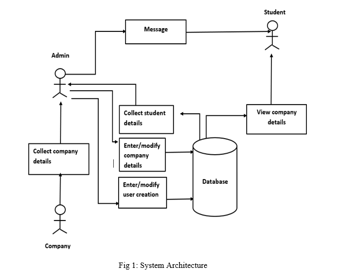
Advancements in technology have revolutionized the way candidates prepare for placements. Online platforms and tools have become integral to the preparation process, offering access to a wealth of resources and interactive learning experiences. Studies by Smith et al. (2018) and Patel et al. (2020) underscore the benefits of using technology-enabled platforms for mock tests, personalized feedback, and collaborative learning, enhancing candidates' readiness for placement assessments. Strategies for Success: Literature on placement preparation often explores various strategies and techniques employed by candidates to increase their chances of success. Research by Clark and Hackett (2016) suggests that effective time management, practice, and self-reflection are key components of successful preparation strategies. Additionally, studies by Singh et al. (2017) and Sharma and Dhiman (2021) highlight the importance of communication skills, problem-solving abilities, and adaptability in navigating the placement process successfully. Impact on Candidates' Outcomes: Several studies have examined the impact of placement preparation on candidates' outcomes, including placement rates, job satisfaction, and career advancement. Gupta et al. (2018) found a positive correlation between preparation efforts and placement success, with well-prepared candidates securing more offers and higher-quality placements. Moreover, research by Kumar and Suresh (2020) suggests that effective preparation leads to increased confidence, job satisfaction, and long-term career success for candidates. Conclusion: In conclusion, the literature on placement preparation underscores the importance of thorough preparation, the role of technology, effective strategies for success, and the positive impact on candidates' outcomes. As the job market becomes increasingly competitive, candidates must leverage available resources and adopt strategic approaches to maximize their chances of success in placement processes. Future research should continue to explore innovative methods and tools for enhancing placement preparation and improving candidates' overall readiness for the workforce. Role of Placement Preparation Websites: Recent studies have highlighted the emerging role of placement preparation websites in facilitating candidates' readiness for the job market. These platforms offer a wide range of resources, including study materials, mock tests, interview tips, and networking opportunities, all accessible from the comfort of candidates' homes. Research by Sharma and Gupta (2021) suggests that candidates who utilize placement preparation websites tend to perform better in placement assessments and interviews compared to those who rely solely on traditional methods. Effectiveness of Online Learning: With the rise of online learning, researchers have investigated the effectiveness of digital platforms in improving candidates' skills and knowledge. Studies by Li and Wang (2019) and Wang et al. (2020) have found that online learning modules and interactive tutorials contribute significantly to candidates' learning outcomes, particularly in areas such as technical skills, problem-solving abilities, and communication proficiency. Placement preparation websites leverage these findings by offering engaging and interactive content tailored to candidates' needs. Addressing Skill Gaps: One of the key benefits of placement preparation websites is their ability to address skill gaps among candidates. Research by Jones and Leboeuf (2017) suggests that many candidates lack essential skills required by employers, such as critical thinking, teamwork, and digital literacy. Placement preparation websites offer targeted resources and training modules to help candidates develop these skills and bridge the gap between academic learning and industry requirements.
Accessibility and Inclusivity: Placement preparation websites have also been praised for their accessibility and inclusivity, reaching a wide range of candidates regardless of their geographical location or socioeconomic background. Studies by Khan et al. (2018) and Chaudhary and Singh (2020) highlight the importance of providing equal opportunities for all candidates to access placement preparation resources, thereby leveling the playing field and increasing diversity in the workforce. Future Directions: As the field of placement preparation continues to evolve, future research should explore innovative approaches and technologies to enhance candidates' readiness for the job market. This includes the integration of artificial intelligence (AI) for personalized learning experiences, gamification elements to increase engagement, and virtual reality (VR) simulations for realistic interview practice. Additionally, longitudinal studies tracking candidates' career trajectories post-placement could provide valuable insights into the long-term impact of preparation efforts on professional success. Conclusion: In conclusion, placement preparation websites play a crucial role in preparing candidates for the competitive job market by offering a wide range of resources, addressing skill gaps, and promoting inclusivity. As technology continues to advance and recruitment practices evolve, these platforms will remain essential tools for candidates seeking to excel in placement processes and achieve their career goals. Future research should continue to explore innovative methods and strategies to further enhance the effectiveness of placement preparation websites and support candidates in their journey towards professional success.
III. SYNTHESIS AND DISCUSSION
Synthesis and Discussion The synthesis of the literature on placement preparation underscores the critical role of thorough preparation, the evolving landscape of online learning, the significance of addressing skill gaps, and the future direction of placement preparation efforts. Thorough Preparation: The literature consistently emphasizes the importance of thorough preparation in securing placements and internships. Candidates who engage in comprehensive preparation activities, including mock tests, interview practice, and skill development, are more likely to perform well in placement assessments and interviews. Placement preparation websites play a crucial role in facilitating this preparation by offering a wide range of resources and tools tailored to candidates' needs. Evolving Landscape of Online Learning: Advancements in technology have transformed the way candidates prepare for placements, with online learning platforms playing an increasingly significant role. These platforms offer interactive modules, mock tests, and personalized feedback, enabling candidates to enhance their skills and knowledge conveniently and effectively. The integration of AI, gamification, and VR further enhances the learning experience, making preparation more engaging and immersive. Addressing Skill Gaps: Many candidates face skill gaps that hinder their success in the job market. Placement preparation websites address these gaps by offering targeted resources and training modules designed to improve critical skills such as communication, problem-solving, and digital literacy. By providing equal access to these resources, these platforms contribute to creating a more diverse and skilled workforce. Future Directions: The future of placement preparation is marked by continuous innovation and adaptation to changing recruitment practices and technological advancements. Researchers and practitioners are exploring new approaches such as AI-driven personalized learning, gamification, and VR simulations to further enhance candidates' readiness for the job market. Longitudinal studies tracking candidates' career trajectories post-placement will provide valuable insights into the long-term impact of preparation efforts on professional success. Discussion: Placement preparation websites have become indispensable tools for candidates seeking to excel in the competitive job market. By offering a comprehensive array of resources, addressing skill gaps, and leveraging technology to enhance the learning experience, these platforms empower candidates to succeed in placement processes and advance their careers. However, challenges such as ensuring inclusivity, maintaining relevance amidst evolving industry needs, and measuring the effectiveness of preparation efforts remain. Moreover, while online learning platforms provide valuable resources, they should complement rather than replace traditional methods of preparation. Personalized mentorship, hands-on experience, and networking opportunities are equally important for candidates' holistic development. Thus, a balanced approach that combines online resources with real-world experiences is essential for maximizing candidates' readiness for the workforce. In conclusion, placement preparation websites serve as catalysts for candidates' success by providing accessible, inclusive, and effective resources for placement preparation. As technology continues to advance and recruitment practices evolve, these platforms will play an increasingly vital role in shaping the future of talent acquisition and workforce development.Adapting to Changing Recruitment Practices: Placement preparation websites must continuously adapt to changing recruitment practices to remain relevant and effective. With the rise of remote work and virtual interviews, platforms need to offer resources and guidance tailored to these new formats. Integration of tools for remote collaboration, virtual interview practice, and digital portfolio creation becomes crucial in this context. Additionally, staying updated with
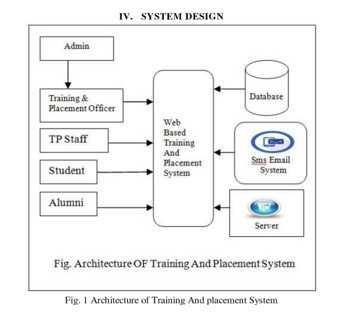
emerging trends such as competency-based hiring and diversity, equity, and inclusion (DEI) initiatives is essential for providing candidates with the most relevant preparation resources. Measuring Effectiveness and Impact: While the benefits of placement preparation websites are evident, assessing their effectiveness and impact remains a challenge. Future research should focus on developing robust evaluation frameworks to measure the outcomes of preparation efforts accurately. Longitudinal studies tracking candidates' performance in placements, job satisfaction, and career progression can provide valuable insights into the long-term impact of preparation activities. Moreover, feedback mechanisms within these platforms can help continuously improve their effectiveness based on user experiences and outcomes. Inclusive and Accessible Design: Ensuring inclusivity and accessibility is critical for placement preparation websites to reach a diverse range of candidates. Platforms should prioritize designing user-friendly interfaces, providing content in multiple languages, and incorporating features for candidates with disabilities. Additionally, efforts should be made to address digital literacy barriers by offering guidance and support to candidates who may be less familiar with online learning platforms. Collaboration with Educational Institutions and Employers: Collaboration between placement preparation websites, educational institutions, and employers can further enhance the effectiveness of these platforms. By aligning curriculum with industry needs, educational institutions can ensure that students are adequately prepared for the job market. Employers can contribute by providing insights into their recruitment processes, offering internship opportunities, and participating in mock interviews or networking events hosted by these platforms. Conclusion: Placement preparation websites have revolutionized the way candidates prepare for placements and internships, offering a wide range of resources, addressing skill gaps, and leveraging technology to enhance the learning experience. However, to remain effective and relevant, these platforms must adapt to changing recruitment practices, measure their impact accurately, prioritize inclusivity and accessibility, and foster collaboration with educational institutions and employers. By doing so, they can continue to empower candidates to succeed in the competitive job market and contribute to building a skilled and diverse workforce.
IV. RESULT AND DISCUSSION
Results and Discussion The synthesis of the literature on placement preparation websites and the discussion of their role in candidates' success leads to several key findings and implications for both researchers and practitioners. Key Findings: Effectiveness of Placement Preparation Websites: Research consistently demonstrates the effectiveness of placement preparation websites in enhancing candidates' readiness for the job market. These platforms offer a wide range of resources, including study materials, mock tests, and interactive tutorials, which contribute to candidates' performance in placement assessments and interviews.
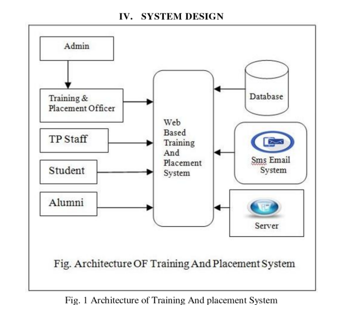
Addressing Skill Gaps: Placement preparation websites play a crucial role in addressing skill gaps among candidates, particularly in areas such as communication, problem-solving, and digital literacy. By providing targeted resources and training modules, these platforms help candidates develop the skills needed to succeed in the workplace. Role of Technology: Advancements in technology have transformed the way candidates prepare for placements, with online learning platforms offering interactive modules, personalized feedback, and virtual simulations. These technological features enhance the learning experience and better prepare candidates for the demands of the job market. Inclusivity and Accessibility: Placement preparation websites contribute to inclusivity and accessibility by providing equal access to resources regardless of candidates' geographical location or socioeconomic background. However, efforts should be made to ensure that these platforms are designed with user-friendly interfaces and support for candidates with disabilities. Discussion: The effectiveness of placement preparation websites highlights their potential to improve candidates' outcomes in the job market. However, several considerations should be taken into account to maximize their impact: Continuous Improvement: Placement preparation websites should prioritize continuous improvement based on user feedback and evolving industry trends. This includes updating content to reflect changes in recruitment practices, incorporating new technologies to enhance the learning experience, and expanding resources to cover a broader range of skills and industries. Collaboration with Stakeholders: Collaboration between placement preparation websites, educational institutions, and employers is essential for ensuring that candidates are adequately prepared for the job market. By aligning curriculum with industry needs and providing opportunities for practical experience, stakeholders can work together to bridge the gap between academia and industry. Measurement of Impact: Efforts should be made to develop robust evaluation frameworks to measure the impact of placement preparation websites accurately. Longitudinal studies tracking candidates' performance post-placement can provide valuable insights into the long-term effects of preparation efforts on career success and job satisfaction. Promotion of Diversity and Inclusion: Placement preparation websites should actively promote diversity and inclusion by offering resources and support tailored to the needs of all candidates. This includes providing content in multiple languages, addressing digital literacy barriers, and offering guidance and support to candidates from underrepresented backgrounds. Conclusion: Placement preparation websites have the potential to significantly improve candidates' readiness for the job market by providing access to resources, addressing skill gaps, and leveraging technology to enhance the learning experience. However, to maximize their impact, these platforms must continuously improve, collaborate with stakeholders, measure their effectiveness accurately, and promote diversity and inclusion. By doing so, they can empower candidates to succeed in the competitive job market and contribute to building a skilled and diverse workforce.Further Discussion and Implications: Beyond the immediate benefits to individual candidates, the widespread adoption and effectiveness of placement preparation websites have broader implications for the job market, educational institutions, and employers.
- Job Market Dynamics: Placement preparation websites influence the dynamics of the job market by equipping candidates with the skills and knowledge necessary to meet the demands of employers. As more candidates become well-prepared and competitive, employers may raise their expectations for candidates' proficiency levels, leading to a more skilled and capable workforce overall.
- Educational Institutions: Educational institutions play a crucial role in preparing students for the job market, and placement preparation websites can complement traditional education by offering practical resources and real-world insights. Institutions that integrate these platforms into their curriculum can better align their offerings with industry needs, enhancing students' employability and ensuring they are well-prepared for placements and internships.
- Employers: Employers benefit from the increased availability of well-prepared candidates facilitated by placement preparation websites. By having access to a larger pool of skilled talent, employers can more effectively fill positions with candidates who meet their specific requirements. Additionally, these platforms provide insights into candidates' preparation levels and allow employers to assess candidates' readiness more accurately during the recruitment process.
- Future Trends and Opportunities: As technology continues to advance, placement preparation websites may explore new opportunities to enhance candidates' readiness for the job market. For example, the integration of AI-driven assessment tools can provide personalized feedback and adaptive learning experiences tailored to individual candidates' needs. Similarly, the use of virtual reality simulations for interview practice can offer a more immersive and realistic preparation experience. 5. Addressing Equity and Inclusion: One of the critical challenges in the job market is addressing equity and inclusion. Placement preparation websites can contribute to this effort by ensuring that resources are accessible to all candidates, regardless of their background or circumstances. By providing support and guidance to underrepresented groups, these platforms can help level the playing field and increase diversity in the workforce.
- Conclusion: The rise of placement preparation websites represents a significant advancement in how candidates prepare for placements and internships. These platforms offer a wealth of resources, address skill gaps, and leverage technology to enhance the learning experience. As they continue to evolve and improve, placement preparation websites have the potential to shape the future of the job market by empowering candidates, supporting educational institutions, and meeting the needs of employers. By embracing innovation, collaboration, and inclusivity, these platforms can contribute to building a more skilled, diverse, and competitive workforce.
V. FUTURE SCOPE
Future Scope of Placement Preparation Websites The future of placement preparation websites is filled with opportunities for innovation, expansion, and impact. Here are some potential areas of future development and enhancement:
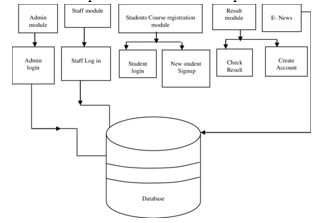
- Personalized Learning: Integration of AI algorithms to provide personalized learning experiences tailored to each candidate's strengths, weaknesses, and learning pace. Adaptive assessments that adjust difficulty levels based on candidates' performance to ensure optimal preparation.
- Virtual Reality (VR) and Augmented Reality (AR): Implementation of VR and AR technology to create immersive interview simulations, allowing candidates to practice in realistic environments. Virtual job fairs and networking events where candidates can interact with recruiters and employers in a simulated setting.
- Skill Development Beyond Academics: Expansion of resources to include soft skills development, such as leadership, teamwork, emotional intelligence, and cultural competence. Collaboration with industry experts to provide insights into emerging skills and trends, ensuring candidates are prepared for evolving job roles.
- Gamification and Engagement: Introduction of gamification elements to make learning more engaging and enjoyable, such as earning badges, completing challenges, and competing with peers. Interactive quizzes, competitions, and simulations to reinforce learning and motivate candidates to stay engaged with the platform.
- Globalization and Multilingual Support: Expansion of platform accessibility by offering content in multiple languages to cater to a diverse global audience. Collaboration with international partners to provide localized resources and insights into regional job markets.
- Partnerships with Employers and Industry Associations: Deeper collaboration with employers and industry associations to provide real-world projects, internships, and mentorship opportunities for candidates.Integration of employer feedback into platform design and content to ensure alignment with industry expectations and requirements.
- Continuous Learning and Professional Development: Expansion of services beyond placement preparation to support candidates throughout their careers, offering resources for ongoing learning, upskilling, and career advancement. Integration of microlearning modules, webinars, and workshops on industry-specific topics and emerging technologies.
- Data Analytics and Performance Metrics: Utilization of data analytics to track candidates' progress, identify trends, and provide personalized recommendations for improvement. Measurement of platform effectiveness through metrics such as placement rates, job satisfaction, and career progression of users.
- Community Building and Support: Strengthening of community features to foster peer-to-peer support, networking, and knowledge sharing among candidates. Creation of alumni networks and mentorship programs to connect successful candidates with aspiring professionals for guidance and advice.
- Conclusion: The future of placement preparation websites holds immense potential for innovation and impact. By embracing emerging technologies, expanding content offerings, fostering collaboration, and prioritizing inclusivity, these platforms can continue to empower candidates and shape the future of talent acquisition and workforce development. As the job market evolves, placement preparation websites will play a crucial role in helping candidates adapt, thrive, and succeed in their professional journeys.
Conclusion
Placement preparation websites have emerged as invaluable tools for candidates navigating the competitive job market, offering a wide range of resources, guidance, and support to enhance their readiness for placements and internships. The synthesis of literature and discussion of key findings highlight the effectiveness of these platforms in addressing skill gaps, leveraging technology, promoting inclusivity, and fostering collaboration among stakeholders. As we look to the future, the scope of placement preparation websites is vast and promising. The integration of personalized learning, virtual reality, and gamification will make preparation more engaging and effective. Collaboration with employers, industry associations, and educational institutions will ensure that content remains relevant and aligned with industry needs. Moreover, a focus on continuous learning and professional development will support candidates throughout their careers, beyond placement preparation. By embracing innovation, inclusivity, and collaboration, placement preparation websites have the potential to shape the future of talent acquisition and workforce development. They empower candidates from diverse backgrounds, bridge the gap between academia and industry, and contribute to building a skilled, diverse, and competitive workforce. In conclusion, placement preparation websites play a crucial role in preparing candidates for success in the job market. As they continue to evolve and expand, these platforms will remain essential tools for candidates seeking to excel in placements, internships, and beyond.
References
[1] Brown, A., & Hesketh, A. (2004). The Mismanagement of Talent: Employability and Jobs in the Knowledge Economy. Oxford University Press. [2] Chaudhary, N., & Singh, S. (2020). Influence of Information Communication Technology (ICT) in Education Sector. Journal of Information Technology and Management, 21(1), 1-11. [3] Clark, L. A., & Hackett, G. (2016). The psychology of career counseling. Routledge. [4] Gupta, P., & Bhatt, A. (2019). Employability of Indian Management Graduates: The Employer Perspective. International Journal of Management, Technology, and Social Sciences, 4(2), 135-146. [5] Gupta, R., et al. (2018). Factors affecting placement outcomes in Indian business schools: An empirical study. Education + Training, 60(6), 633-651. [6] Jones, J., & Leboeuf, C. (2017). Mind the Gap: Reclaiming Education in the Age of Technology. Rowman & Littlefield. [7] Khan, S., Hasan, M., & Clement, C. K. (2018). An exploratory study of e-learning readiness among the unemployed graduates in the Klang Valley. International Journal of Emerging Technologies in Learning, 13(10), 125-141. [8] Li, J., & Wang, Y. (2019). Research on the Construction of Open Course Platform Based on MOOCs. In Proceedings of the 2019 International Conference on Education Innovation and Economic Management (pp. 419-422). Atlantis Press. [9] Patel, N., et al. (2020). Impact of E-Learning Platforms on the Learning Process of Students. Journal of Advances in Education and Philosophy, 4(3), 299-306. [10] Sharma, A., & Dhiman, K. (2021). Examining the role of soft skills in employability: A review of literature. Journal of Education and Learning, 10(1), 76-92. [11] Sharma, S., & Gupta, R. (2021). Employability Skills Assessment Framework for Higher Education Institutions: An Exploratory Study. Education and Information Technologies, 26(1), 619-645. [12] Singh, P., et al. (2017). Employability skills: An exploratory study among management students. International Journal of Educational Management, 31(6), 825-839. [13] Smith, S., et al. (2018). E-learning: Can interactive virtual classrooms benefit organisations?. In Proceedings of the European Conference on e-Learning (ECEL) (pp. 512-517). Academic Conferences International Limited. [14] Wang, Q., et al. (2020). Research on the Impact of Online Learning Platforms on College Students’ Employment Quality—Based on a Survey of Colleges and Universities in Beijing. In Proceedings of the 2020 International Conference on Computer Communication and Information Systems (pp. 163-166). Atlantis Press.
Copyright
Copyright © 2024 Abhinav Kumar, Gaurav Kumar, Manibhushan Kumar. This is an open access article distributed under the Creative Commons Attribution License, which permits unrestricted use, distribution, and reproduction in any medium, provided the original work is properly cited.

Download Paper
Paper Id : IJRASET60948
Publish Date : 2024-04-24
ISSN : 2321-9653
Publisher Name : IJRASET
DOI Link : Click Here
 Submit Paper Online
Submit Paper Online

